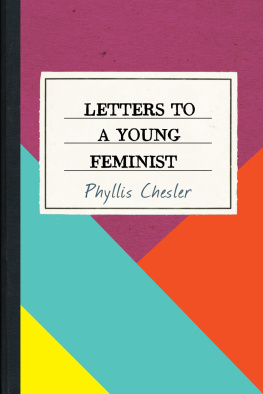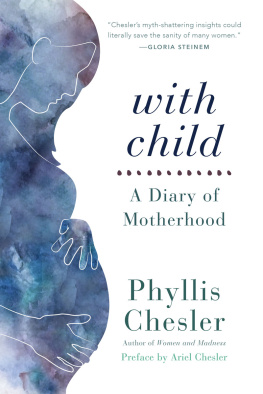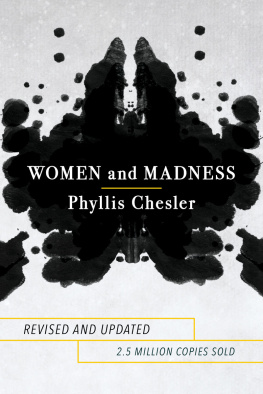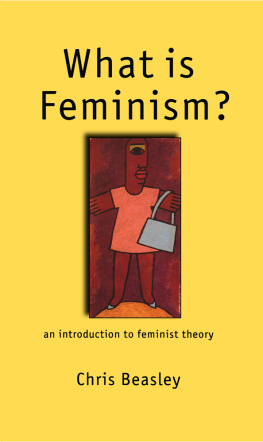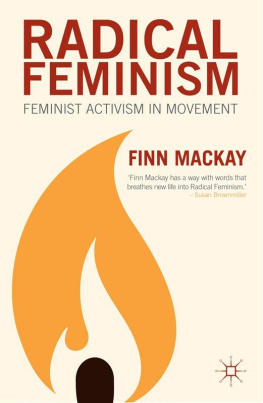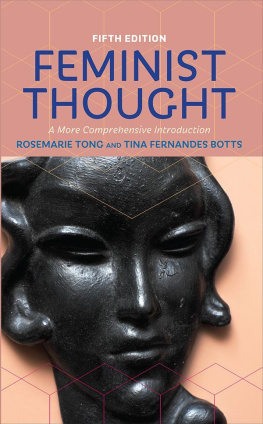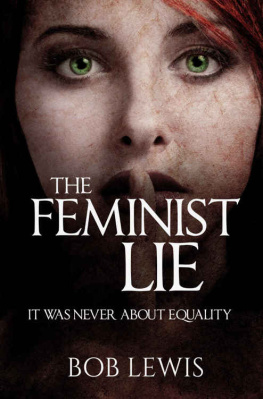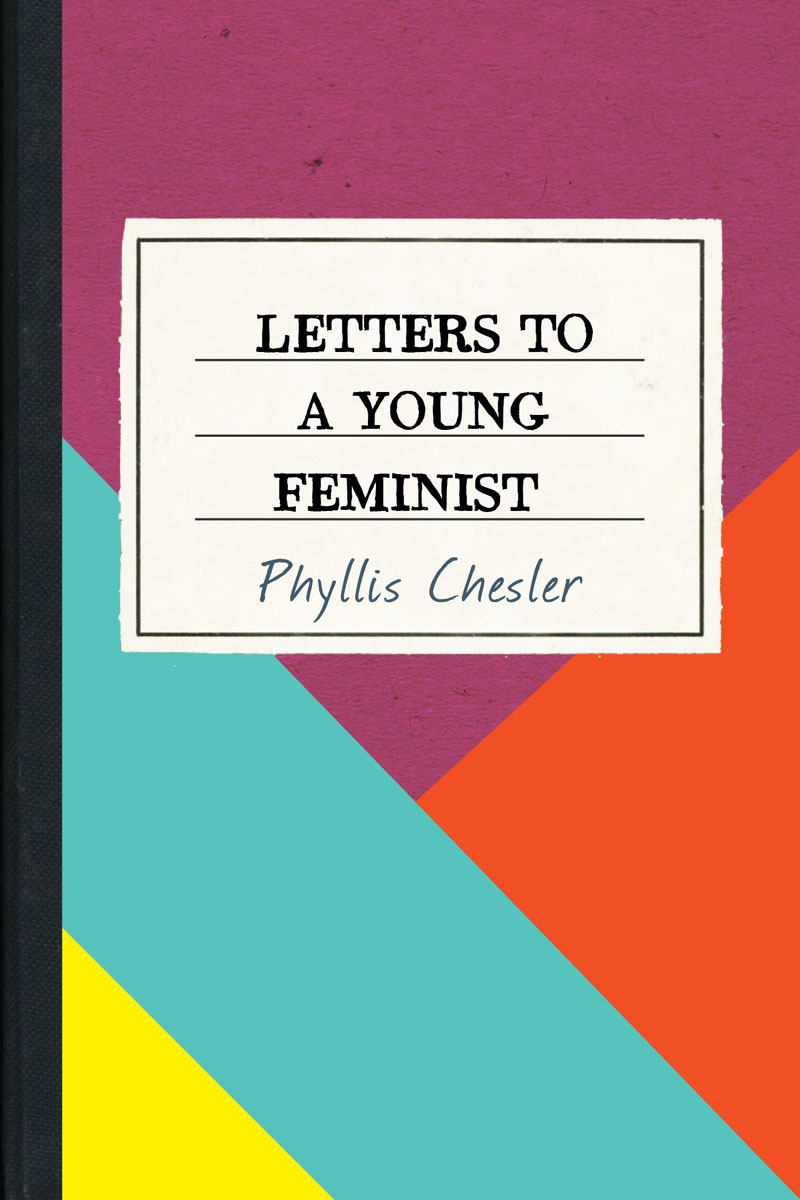

Also by Phyllis Chesler
Mothers on Trial: The Battle for Children and Custody
A Politically Incorrect Feminist
With Child: A Diary of Motherhood
Women and Madness
Womans Inhumanity to Woman
Copyright 1997 by Phyllis Chesler
Published by arrangement with the author
All rights reserved
This edition published in 2018 by Lawrence Hill Books
An imprint of Chicago Review Press Incorporated
814 North Franklin Street
Chicago, Illinois 60610
ISBN 978-1-64160-028-6
Library of Congress Cataloging-in-Publication Data
Is available from the Library of Congress.
Cover design: Lindsey Cleworth Schauer
Interior design: Acme Art, Inc.
Printed in the United States of America
This work is dedicated to my dearest friend, Merle Hoffman, whose love and generosity and talent sustained me during six years of an awful illness.
Contents
Acknowledgments
I thank the staff at Four Walls Eight Windows: Kathryn Belden, John G. H. Oakes, and JillEllyn Riley, both for their creative suggestions and for their publishing vision. I especially thank my intern and first reader, Sanda Balaban, for her steady presence and supremely literate comments. I thank my assistant, and former student, Darlene Dowling, for her steadfastness and devotion. I thank my lawyer, Susan L. Bender for her noble and tender services. I thank Ginny Daly and the staff at Duke Universitys Perkins Library Special Collections Department where my archives reside, for their bibliographic expertise. I thank my son, Ariel David Chesler, for both his feminist and filial interest in this work. I thank my acupuncturist, Helene Kostre, my chiropractor, Harvey Rossell, my dentist, Michael Iyott, and my internists, David Zimmerman and Susan Levine, for all helping me keep my immune system up and running.
LETTER ONE
Your Legacy
H ERE I SIT, HEAD BENT , writing you an intimate letter. I sense your presence, even though I dont know your name. I envision you as a young woman, possibly a young man, somewhere between the ages of eighteen and thirty-five, but you may also be a decade olderor youngerthan that. You may not yet be born.
Perhaps I am trying to speak to my own younger self. When I was coming of agea process which is still far from overno one ever spoke strong truths to me in a loving voice. When I was your age, I did not know what I needed to know in order to understand my lifeanybodys life. Perhaps, in writing to you, I wish to correct that, to make amends.
In the past, Niccolo Machiavelli wrote a letter such as mine to a prince, Sun Tzu to a king, Virginia Woolf to a gentleman, Rainer Maria Rilke to a male admirer. This letter is for you. You are either poor or rich; you are any or all the colors of the human rainbow, all shades of luck and character. You are my heir. This letter is your legacy. Without your conscious intervention, that legacy may again lie dormant for one hundred years. Or longer.
I imagine you are a person who wants to know why evil exists. People commit evil deeds because we, the good people, do not stop them. To quote Edmund Burke: All that is necessary for the forces of evil to win in the world is for enough good men to do nothing. Ah, Burke, evil also triumphs when good women do nothing.
Men alone are not responsible for patriarchy; women are also their willing, even ardent, collaborators.
Perhaps you believe you can have it all: a brilliant career, a loving, life-long marriage, healthy children/no children, enough money, and happiness too. If youre anything like I was, you probably believe that whatever awful things may have happened to women in the past, or still are happening to other women today, cannot happen to you.
Darling, I dont want to frighten you away, but I dont want to waste your time either, so I cant pretend that simply because you or I want it to be so that in fact women and men are equal.
Even when men and women do exactly the same thing, it means something different. The father who changes a diaper is often seen as a hero; not so the mother who is, after all, only doing what shes expected to do. This is not true in reverse. The woman who succeeds in a mans worldalthough she is not expected to do sois rarely treated as a conquering hero. She is, more often, seen as an aggressive bitch. She may well be aggressivebut no more than her male colleagues are. Some women try to prove their worth by outdoing their male colleagues in tough, anti-female behavior. Some women feel compelled to behave in feminine or maternal ways to appease those who would otherwise punish them for stepping so far out of line.
Thus, unlike her male counterparts, the chief judge pours her own coffee, and the police officer may not use what shes learned on the job to stop her husband from beating her; whatever shes learned at work cant over-ride what shes learned all her life about being a woman. The female employeenot her male counterpartis still expected to buy the gifts, take the coats, bake the cookies for an office party, babysit her employers child. Hardly gang-rape, but sexism nevertheless.
Yes, the world is different now than it was when I was your age. In only thirty years, a visionary feminism has managed to seriously challenge, if not transform, world consciousness. Some astronauts, army officers, ministers, prime ministers, and senators are womenthere are womens studies programs too, and you cant open a newspaper without reading about some man on trial for rape or sexual harassment. But the truth is women are still far from free. Were not even within striking range.
Fundamentalist passions are threatening to destroy what feminists have accomplished. Three examples immediately come to mind.
The right to an abortion remains under an increasingly bloody siege.
Although we now understand that rape is epidemic and has lasting consequences, we are, as yet, unable to stop it. Today, in Algeria, Bangladesh, Bosnia, Guatemala, Haiti, Rwanda, rape has become a systematic, full-fledged weaponnot merely a spoilof war. In an era of ethnic cleansing, rape is a form of gender cleansing.
We remain separate and unequalsegregated both by race and gender. In the 1950s and 1960s, brave, young, African-American school children were confronted with adult faces contorted with rage, verbal abuse, turned backs, and hate-filled hearts when they integrated previously all-white schools. Today, brave young women are facing similar fury and danger for trying to integrate traditionally male-only military schools such as the Citadel in South Carolina.
In 1995, heroic nineteen-year-old Shannon Faulkner, the first woman ever to enroll in the previously all-male institution, faced the hate alone; she (and many young men) left after a few weeks. In September of 1996, four women were admitted. By December, two women, Kim Messer and Jeanie Mentavlos, and seventy-five men had quit. While all first-year cadets endured sadistic ritual hazing and harassment, the female cadets were singled out and, in addition to all else, subjected to vulgar songs about masturbation, obscene pictures, sexualized physical intimidation, and death threats. One was also set on fire. Like Faulkner, they were hated out.
The most extraordinary legal victories are only scraps of paper until human beings test them on the ground. As I write, twenty-four young women have been accepted as cadets at the Citadel. Like their African-American counterparts, the women will not be deterredbut they will pay a high price.
Next page
